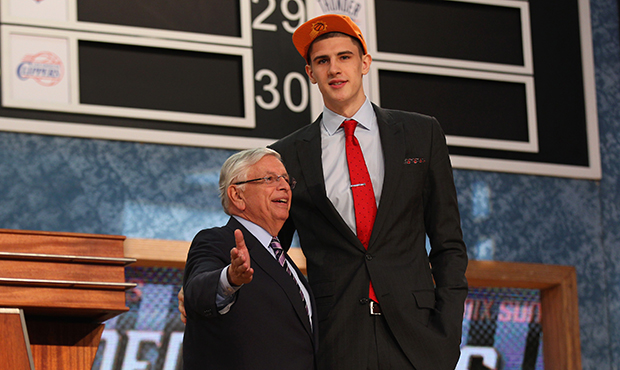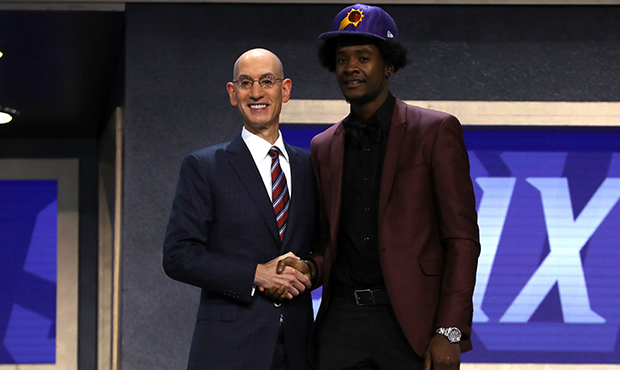Tuesday is the 2019 NBA Draft Lottery, the day the Phoenix Suns will find out where they are set to pick in the 2019 NBA Draft.
Currently positioned with the third-best odds, the Suns could drop all the way to seventh.
If Phoenix remains in the top-five, though, it will be its fourth straight year doing so. That will extend the franchise record of doing so from their third year in a row last season.
Here’s a look at the last five selections by the Suns in the top-five.
1987: Armen Gilliam, No. 2 overall
We start all the way back in the 1980s to the selection of Gilliam in 1987.
Going No. 2 overall one spot behind David Robinson (ouch!), Gilliam was All-Rookie First Team in 1988 with 14.8 points and 7.9 rebounds a game.
Gilliam was traded by the Suns in 1989 to the Charlotte Hornets for Kurt Rambis. He went on to have a 15-year career in the NBA.
2013: Alex Len, No. 5 overall
Touted for his potential versatility out of the post offensively and athleticism defensively, it became apparent in a hurry Len wasn’t anything more than a traditional NBA big man.
The hurdles Len had to work through his first four seasons in Phoenix were that he was a poor finisher at the rim, an above average rebounder and adequate defensive presence around the rim who had no individual offensive skills.
What did that turn into? Well, in his fifth and final year with the Suns for the 2017-18 season, he shot a career-high 56.6% from the field and played the best basketball of his career.
But the past frustrations and inconsistency, along with the selection of Deandre Ayton in the NBA Draft, all but wrapped up his time in Phoenix.
Len signed a two-year deal with the Atlanta Hawks last summer and averaged a career-high 11.1 points per game this season. Along with that scoring uptick came a newly-armed 3-point shot he hit at an impressive 36.3% clip on 2.6 attempts a game. Perhaps that’s the last little wrinkle to Len’s game that makes him a solid NBA big man.
2016: Dragan Bender, No. 4 overall
From bringing the ball up at summer league to playing minutes at small forward under Earl Watson, it’s been an adventure during Bender’s tenure as a Sun.
At a certain point in that tenure, it became clear that Bender’s confidence and aggression issues were the primary road block in his quest to be a positive contributor.
That led to the Suns declining the fourth-year option on his contract for the 2019-20 season, making him an unrestricted free agent.
As it turns out, Bender worked through some of those concerns and had by far his best season, minus the whole 15% dropoff in his 3-point shooting. Showing he can finish more around the rim and be more consistent, the question now becomes if the 21-year-old is brought back as a rotation big for Monty Williams and if Bender would even take the opportunity to do so.
2017: Josh Jackson, No. 4 overall
It’s been a frustrating two seasons for Jackson, where a lack of a defined role and a constantly shuffling coaching staff can be blamed just as much as his overall development.
The biggest issue for the 22-year-old has been his decision-making as a ball-handler.
When taking into consideration how often Jackson uses possessions and how many times that results in an assist or turnover, there are only three other players this decade who put up similar numbers, per Basketball-Reference. That’s not good!
In his career, Jackson has more turnovers (319) than assists (302) and his efficiency (41.5 FG%, 29.4 3P%) has not been able to cancel that out to create an effective player.
As far as defensively, Jackson has shown the promise that made him so desirable out of Kansas, but it once again comes down to his erratic play and inconsistencies.
Jackson, however, is still young and is the player on the roster who would benefit the most from stability.
2018: Deandre Ayton, No. 1 overall
Ayton met the hype of the franchise’s first-ever top selection as a rookie.
He averaged 16.3 points a night and his 10.3 rebounds per game led the team and all rookies.
Showing elite efficiency at 58.5% shooting from the field and 74.6% from the foul line, Ayton’s 60.8% true shooting percentage is the best-ever by a rookie averaging a double-double.
Ayton became only the 35th rookie in league history to average at least 16 points and 10 rebounds a game. He’s only the third to do so since 2000, joining Karl-Anthony Towns and Blake Griffin.
He is firmly positioned as the team’s 1B long-term building block right alongside 1A Devin Booker.




